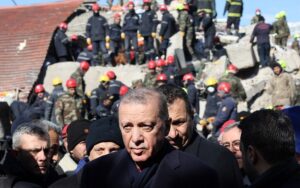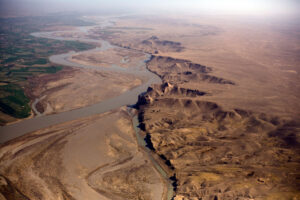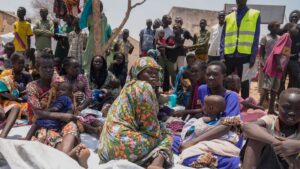
The National Interest Foundation Newsletter
Issue 193, June 2, 2023
Welcome to our NIF Newsletter. In this week’s headlines: we analyze the challenges Turkey will face as Recep Tayyip Erdogan begins his 3rd term as president, investigate the clash between Iranian and Afghan border forces, and examine how Sudan’s Resistance Committees are working to create a pathway toward peace and democracy.
Written by Jacob Van Veldhuizen
Challenges Turkey Will Face

Erdogan must address a multitude of challenges as he begins his 3rd term as president. (Photo from AFP)
What a 3rd Erdogan Term Means for Turkey
With Turkish President Recep Tayyip Erdogan’s win in the recent runoff election comes many questions about the path forward for Erdogan and Turkey. This was the most difficult elections he has ever faced. Inflation hovers at around 60%, entire cities were destroyed by an earthquake (a disaster made worse by the government’s lackluster response), and the increasing pressure from the West to put sanctions on Russia all add up to significant negative attention for a president running for re-election. Nonetheless, these issues were not enough to unseat him. In the end, Erdogan won with 52.2% of the vote, while his opponent, Kemal Kilicdaroglu, won 47.8% of the vote. Erdogan’s win does come with a lot of work for his government though. They must address the ongoing economic crisis fueled by ever-increasing inflation, rebuild entire cities, and navigate the progressively tense relationship with its NATO allies if they hope to be able to govern effectively.
Erdogan largely owes his victory to the vast and unwavering support he has in the rural areas of central Turkey. Election results show that every large city and coastal region except for Hatay, Gaziantep, and Sanliurfa voted for his opponent, Kilicdaroglu. Erdogan has long enjoyed a wide base of support in the rural regions of Turkey, where his Islamic and nationalistic stances appeal to many people. This is despite the continuing pressure of inflation that particularly affects those living in rural areas. Many families are facing increased hardship because of this inflation. This was not enough to sway the voters away from Erdogan. Erdogan utilized Turkish nationalism to great success, often referencing the past glory of the Ottoman Empire and other exploits in Turkish history. This coupled with his push to incorporate Islam more in government propelled him to his election victory.
Traditionally in governance, Turkey followed Kemalism, a modernization philosophy created by the founding father of modern-day Turkey, Mustafa Kemal Ataturk. Kemalism is mainly based on the idea that to progress and modernize, the Turkish government must shift to a more secular form of governance, among other reforms. Erdogan has always pushed back against this idea, even landing himself in prison before being elected as the mayor of Istanbul because of his resistance to secularism. His religious upbringing still influences many of his policies, and these policies appealed to the large base of devout Muslims in Turkey.
Erdogan is in a very precarious but potentially advantageous position on the geopolitical stage. He appears to be positioning himself between NATO and Russia allowing Turkey to serve in the mediating position, elevating its stance and allowing them to punch about their political weight class. Erdogan has already shown his ability to mediate after his government and the United Nations negotiated a deal that allowed for the transportation of grain and fertilizers from Ukraine to Middle Eastern countries suffering from food shortages. As both a NATO member and a country with positive relationships with Russia and Iran, Turkey could prove to be a valuable partner to have in the Middle East. These relationships are a double-edged sword, as in fostering a relationship with Russia and Iran, they have caused a significant strain in their relationship with their traditional Western allies. This has not been aided by Russian President Vladimir Putin’s efforts to exploit the deepening wedge between Turkey and the West. Turkey also has reasons to begin to explore other options, as their NATO allies haven’t been helpful partners in the past. One notable example is Turkey repeatedly being blocked from joining the European Union, of which there is significant overlap with NATO, even before their economic woes. This is despite their modernizing economy, impressive production abilities, and their growing military-industrial complex.
Maintaining relationships with both Russia and NATO will be a difficult but possible balancing act to pull off. Erdogan does not venture without a few safety lines, however. The main stabilizing factor is Turkey’s continued NATO membership. With this not only comes stability in times of tension with NATO allies, but it also gives Turkey a bargaining chip. In NATO, all new members must be unanimously approved. Recently, largely influenced by the Russian Invasion of Ukraine, Finland and Sweden have asked to join NATO. Finland was accepted in April of this year, but there is still a holdout on Sweden. That holdout is Turkey. The power of this bargaining chip can already be seen, as despite strained relations, U.S. President Joe Biden was on the phone with Erdogan soon after he won the election congratulating him and discussing the possible sale of F-16s. Concerning Russia, Turkey has become a lifeline as the country continues to be ostracized for its invasion of Ukraine. This economic connection offers stability in this relationship, at least for the time being.
Democratic backsliding is a major issue to consider in U.S. relations with Turkey. Erdogan has worked to consolidate his power and dismantle the checks and balances. He has also significantly restricted freedom of the press and jailed political opponents to keep them from running against him or members of his political party. This democratic decline continues to push Turkey closer to Russia and away from the West. Working with authoritarian governments is not a novel practice for the U.S., however, it will make any coordination between the two subjected to intense criticism. Promoting human rights and democracy must be an ever-present consideration in U.S. foreign policy. Strengthening our relationship with Turkey may give the U.S. an avenue later to address these issues.
As Turkey navigates these new challenges, its transition toward authoritarianism will likely continue. Many analysts also indicate that without a significant change in policy, which is currently unlikely, the economy will continue to suffer. The challenges Turkey is facing offer many potential paths for the West to rekindle relations with Turkey, and with its growing power in the Middle East, it is a wise step to explore these options.
Clash on the Afghan-Iranian Border

The Helmand River, pictured here, brings water to both Afghanistan and Iran. (Photo from NYT)
Border Clash between Iran and Afghanistan May Lead to Wider Conflict
A deadly clash between Afghan and Iranian guards at the Milak-Zaranj border crossing has raised fears of a new conflict between the two counties. Both sides accuse each other of initiating the fighting that led to the death of at least 2 Iranian and one Afghan guard. The violence has been linked to a decades-old dispute over the Helmand River waters. This is the latest example of what Iranian officials have called a disregard by the Taliban for international laws and border protocols since their takeover of Afghanistan 2 years ago. In 1973, a treaty was reached, but sporadic fighting continued. “In recent years, this treaty has not been adhered to by Afghanistan’s rulers, including the Taliban,” said the Center for International Policy’s Sina Toossi, adding that Kabul has delivered only “a fraction of the agreed amount”. “It has been exacerbated by Iran’s worsening drought conditions, making the water issue increasingly critical,” he explained. Afghanistan is in the process of damming the Helmand River to generate electricity and irrigate agricultural land.
In the past, border clashes between Afghanistan and Iran have not led to wider conflicts, however, with the introduction of the Taliban to the mix, this may change. The Taliban is still relatively inexperienced in governance, especially on the international stage. Many former fighters who have been in government roles have also expressed disdain for their currently bureaucratic roles, wishing to return to their fighting role in the Taliban. It is unclear how deep this sentiment runs throughout the Taliban. This underlying desire to return to fighting makes the Taliban a more volatile neighbor than the former Afghan government.
Thus far, both sides have indicated that they wish to solve the conflict through diplomatic channels. Neither side would benefit from a conflict. This recent clash may be the jolt both sides need to reaffirm past agreements and expand diplomatic relations. Amir Khan Muttaqi, the Taliban administration’s minister of foreign affairs, actually met with Iran’s top diplomat, Hassan Kazemi Qomi, to discuss the water dispute the morning of the clash. This meeting indicates a willingness on both sides to work towards a resolution through diplomatic means.
Wars over the ever-shrinking supply of water and other natural resources will likely increase in frequency and scale in the Middle East and Africa. This conflict offers a glimpse into the future. Wars over limited resources are as old as time itself, and climate change, corruption, and increasing inequality is currently exacerbating. Droughts will become more frequent, leading to food and water shortages in already unstable regions. Authoritarian regimes currently active in the region will continue to compound this growing shortage, masking their corruption by scapegoating neighboring countries.
There are multiple ways to reduce the risk of conflict in both the Afghan-Iranian border and in future conflicts. The first is to address climate change that increases the frequency of shortages of water and other natural resources. Doing so will eliminate or at the very least minimize the number of conflicts related to scarce natural resources. The second and more immediate way is for the international community to promote and facilitate diplomatic negotiations. It is important to punish bad actors, but also important to acknowledge and reward actors who work to avoid conflict. The United States will not be able to do either unilaterally because of the poor relationship it has with both Iran and Afghanistan. China would be the most likely country to broker a deal, as they have worked with Iran before and do not have any serious qualms with Afghanistan. China has also been showing interest in filling the void left in the Middle East by the United States.
Sudan’s Hope Lies in Its Civil Society

Many internally displaced people in Sudan flee to Atbara. (Photo from AP)
Sudan’s Resistance Committees Look for Ways to End the Conflict
Negotiations in Sudan have broken down again as the hope for a peaceful resolution to the conflict in Sudan continues to prove elusive. Sudan’s army withdrew from talks this week aimed at achieving a full cease-fire. The most recent cease-fire, though largely seen as a failure, did bring a reduction in fighting in certain areas. Unfortunately, this still wasn’t enough time for aid organizations to move much-needed food and supplies into the capital city of Khartoum. Many people are still trapped in Khartoum, having the weigh the risks of running out of supplies or being killed while trying to escape the city. Many civilians being treated at the hospital are being treated for multiple gunshot wounds, indicating that they are being targeted intentionally. The fighting has killed at least 700 people, according to the health ministry, but the true number is likely much higher.
Away from much of the fighting lies the city of Atbara, the birthplace of many of Sudan’s revolutionary movements. The city is far away from both Khartoum and Darfur, where much of the fighting is taking place. Many internally displaced people are fleeing to this city, some setting up residence there, while others move on to Egypt. Also in this city is a concentration of Resistance Committees, a nationwide network of activist groups that were the driving force behind the uprising that led to the ousting of longtime autocrat Omar al-Bashir. This group was pushed to the sidelines in 2019 when civilian politicians from the Forces of Freedom and Change coalition formed a transitional government with the military. After the military coup in 2021, these civilian politicians were once again pushed aside as the military assumed power. This leaves a gap that is likely to be filled once again by the Resistance Committees.
A complicating factor is the interference of regional actors from Egypt, Libya, and the Central African Republic. Libyan warlord Khalifa Haftar visited Sudan in the days before fighting broke out to help prepare the Rapid Support Forces (RSF) for the impending conflict. The outside influence will continue to be a barrier to the long-term goals of the Resistance Committees.
The Resistance Committees are currently the best bet Sudan has to bring this conflict to a peaceful end. They are well organized, have political clout, and have the ability and willpower to enact change. Though this group tends to favor the military, they are frustrated with the leaders of both the Sudanese military and the RSF. Some believe that it may be possible to influence the younger officers and soldiers in the military to make the Sudanese army more representative of the people.
Something very important about the Resistance Committees’ discussions is that they are not just discussing how to end the fighting. They are also talking about ways that Sudan can emerge from this conflict as a fledgling democracy. They are planning farther ahead than just peace. This comprehensive approach, coupled with their growing influence, will allow them to play a role in creating peace in Sudan and democracy after that.
Enter the text or HTML code here
